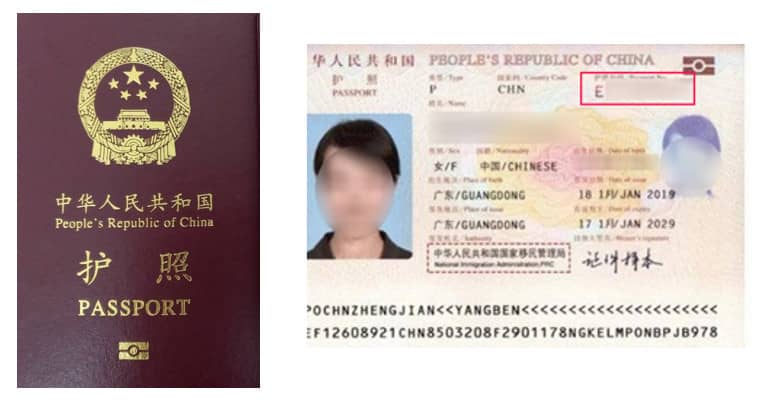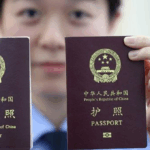Understanding both legal regulations and practical realities is essential to succeed in investing in Vietnam. One of the most complex issues that Chinese investors may face—directly affecting project timelines—arises from the use of passports containing the ‘nine-dash line’ map.
- Origin of the Issue
Since 2012, China has widely issued biometric e-passports to its citizens, which include a map illustrating the ‘nine-dash line’ claim in the South China Sea. This passport has ‘an “E” prefix in the passport number (e.g., E########).

Before that, China used non-electronic passports. Specifically, just prior to 2012, China was using the G-type ordinary passport (Version 97-2), which had a dark brown cover, passport numbers starting with the letter “G”, and no electronic chip. Importantly, earlier versions issued before 2012 did not contain the map with the ‘nine-dash line’ on page 8.
- Vietnam’s Position
Vietnam, along with several other regional countries, firmly rejects the validity of this image as it violates sovereignty. This position is clearly reflected in the following actions:
- Refusing to stamp entry/exit seals directly onto such passports;
- Issuing separate loose-leaf visas instead.
- Severe Impact on Investment Activities
The issue goes beyond immigration procedures. When carrying out key investment procedures, such as:
- Establishing an enterprise;
- Registering an investment project and applying for an investment certificate;
- Registering capital contributions and share acquisitions in Vietnamese companies;
- Applying for sub-licenses for newly established enterprises in Vietnam;
Chinese investors are required to notarize and legalize the passports of management personnel, especially the legal representative, before the competent authorities in Vietnam.
At this stage, notary offices in Vietnam will REFUSE to notarize any documents containing the ‘nine-dash line’ image. As a result, Chinese investors cannot complete their legal dossiers, leading to significant delays or even preventing the project from proceeding.
It should also be noted that establishing companies through a third jurisdiction (such as Singapore or Hong Kong) does not entirely solve the problem, because ultimately, the company must appoint management personnel who are PRC nationals (holding passports with the ‘nine-dash line’). Their personal documents will still need notarization for subsequent legal procedures in Vietnam.
- Who Is Affected?
Below are some positions that frequently require passport information in connection with investment or business procedures in Vietnam, and therefore may be affected by the nine-dash line passport issue:
- The legal representative of the investor (when applying for an investment registration certificate);
- The legal representative of the Vietnamese company;
- The authorized representative of the investor at the Vietnamese company (i.e., the investor’s proxy);
- Less frequently, members of the board of directors of a Vietnamese company.
- Practical Solutions and Recommendations
To overcome this barrier, we propose the following practical solutions in order of priority:
| Priority | Solution | Detailed Description |
| Highest | Use a representative with valid documents | Appoint an individual holding an acceptable passport (e.g., citizen of Hong Kong, Taiwan, or Singapore) as the manager/legal representative of the company established in Vietnam. Substantively, the PRC investor remains the ultimate owner, holding all economic interests (shareholding) and managerial power (control of the board of directors, whose members may include holders of acceptable passports). While this option resolves documentation obstacles during establishment and early operations, PRC investors must ensure robust internal agreements and legal frameworks to secure their rights and control. |
| Feasible | Use alternative acceptable documents | Some Chinese enterprises have attempted to use older G-type passports (Version 97-2, issued before 2012 without the nine-dash line) for notarization. However, this is problematic, as these passports are outdated and may be rejected for security or legal reasons. In practice, some companies have successfully used national ID cards or PRC resident identity cards (with notarized translations) instead of passports. Nevertheless, acceptance depends entirely on the discretion of the competent authority or case officer, not on any official regulation. |
| High risk | Notarize the entire passport or “flexibly” notarize partial content | Some notary offices may agree to notarize the entire e-passport containing the nine-dash line, but the cost is usually very high, and even successful notarization does not guarantee acceptance by investment licensing authorities. In other cases, notaries may only notarize the personal information pages and omit the map pages. This approach, however, carries a high risk of the dossier being rejected during processing. |
- Conclusion
Passports bearing the ‘nine-dash line’ map constitute a serious and real legal barrier that can directly obstruct investment procedures in Vietnam.
In practice, the application of these restrictions varies significantly among localities. While some provinces and cities adopt a strict and cautious stance, others handle the matter more flexibly. Notably, notary offices in smaller localities outside of major centers such as Hanoi or Ho Chi Minh City sometimes apply the rules more loosely.
However, such variations do not establish a safe precedent. Therefore, the optimal and safest choice for Chinese investors remains appointing a representative with valid documents (e.g., a citizen of Hong Kong, Taiwan, or another accepted nationality) right from the dossier preparation stage.
Working closely with an experienced local legal advisor is the key to anticipating risks, ensuring smooth dossier processing, and securing absolute legal safety for the investment.




















